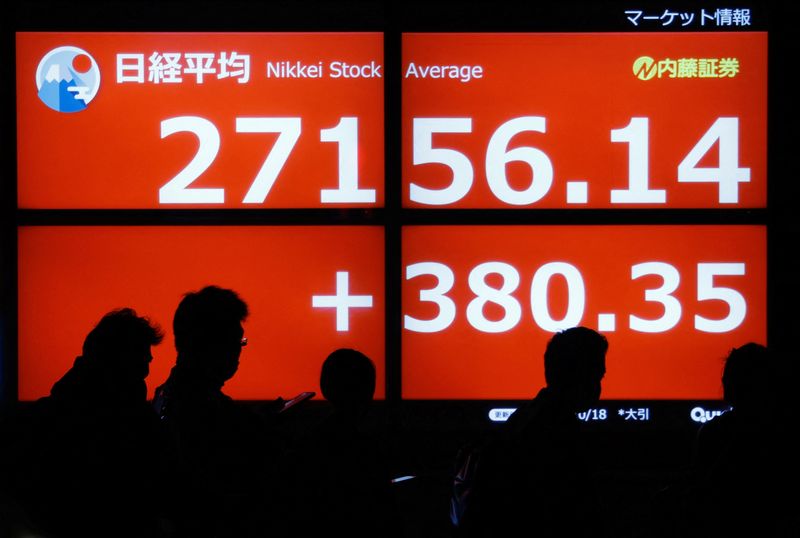Asian shares lower, yields rise on aggressive rate hike jitters
2022.10.20 22:45
[ad_1]

© Reuters. FILE PHOTO: Passersby are silhouetted as they walk past in front of an electric monitor displaying the Japan’s Nikkei share average outside a brokerage in Tokyo, Japan October 18, 2022 REUTERS/Issei Kato
By Ankur Banerjee
SINGAPORE (Reuters) – Asian shares tracked Wall Street lower on Friday while Treasury yields scaled 14-year highs as the prospect of aggressive interest rate hikes from the Federal Reserve and recession risks soured investor sentiment.
MSCI’s broadest index of Asia-Pacific shares outside Japan was down 0.55% but above the two-and-a-half year low it touched on Thursday. Australia’s resources-heavy share index lost 0.74%, while opened 0.38% lower.
China’s stock market opened 0.1% higher on Friday. Xi Jinping, set to clinch a third five-year term as China’s leader, will reveal the members of its elite Politburo Standing Committee at the conclusion of the twice-a-decade congress on Sunday.
“It’s all so tenuous… the problem is the macro environment still remains difficult,” said Shane Oliver, chief economist at AMP (OTC:) Capital, adding that the market is in a tug of war between investors who see opportunities and those who are focused on the difficult environment.
Also weighing on the market were remarks from Philadelphia Federal Reserve President Patrick Harker that suggested the central bank will “keep raising rates for a while.”
U.S. economic data on Thursday showing persistent labor tightness also added to investor angst. U.S. benchmark 10-year Treasury yields to as much as 4.234%, its highest level since June 2008.
“It really is the U.S. bond show that drives broad markets and while liquidity is an issue, talk is there are just no buyers,” said Chris Weston, head of research at Pepperstone.
Global markets have been extremely volatile recently as investors have worried that major economies will be pushed into recessions before inflation is tamed, while a strong dollar as the Fed tightens aggressively would wreak havoc in emerging markets.
In the currency market, sterling dipped lower as investors digested the news that British Prime Minister Liz Truss had quit after just six weeks in office. The pound was last trading at $1.1205, down 0.25% on the day. [/FRX]
Truss’ resignation surprised no-one and was met with little market reaction given the wholesale abandonment of her policies by the finance minister, said Tapas Strickland, head of market economics at National Australia Bank (OTC:).
The Japanese yen hovered near a fresh 32-year low, and last traded at 150.20 per dollar. The currency first weakened past the symbolic 150 level late Thursday afternoon in Tokyo.
Fresh threats of intervention made by Japanese policymakers have kept investors on high alert, although there has been no news of further action since the Ministry of Finance’s dollar-selling, yen-buying intervention last month.
With Japan’s core consumer inflation rate accelerating to a fresh eight-year high of 3.0% in September, the data underscores the dilemma the Bank of Japan faces as it tries to underpin a weak economy by maintaining ultra-low interest rates, which in turn are fuelling an unwelcome slide in the yen.
Meanwhile, gold prices were set for a second weekly decline.
[ad_2]
Source link








